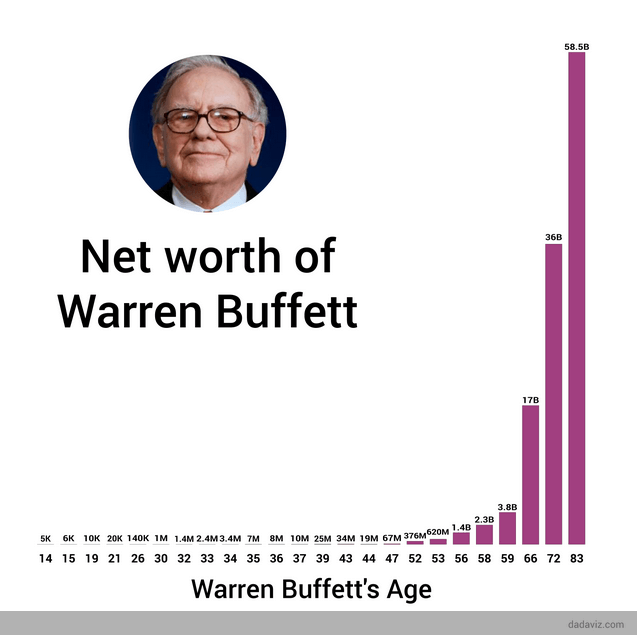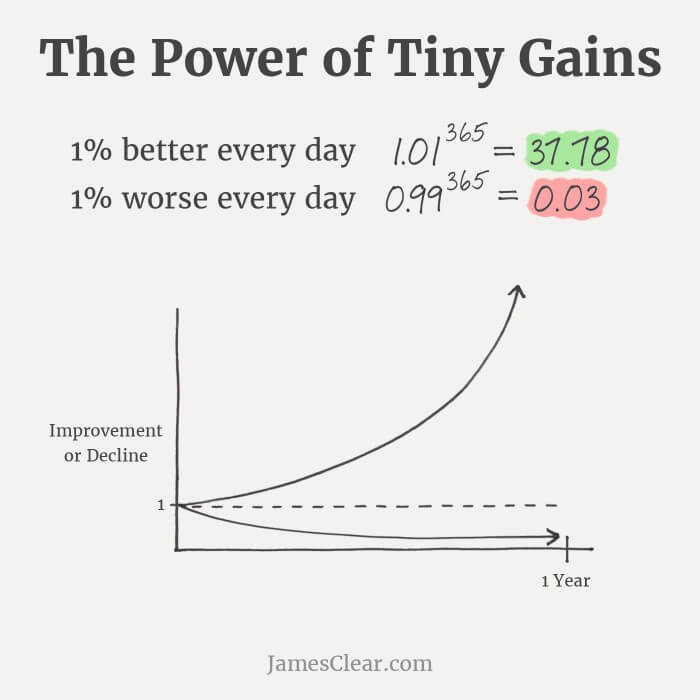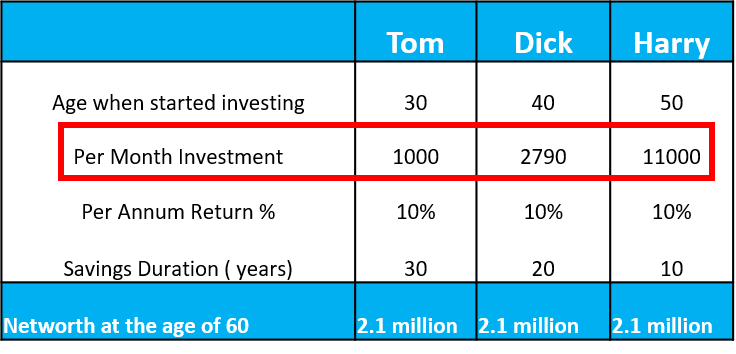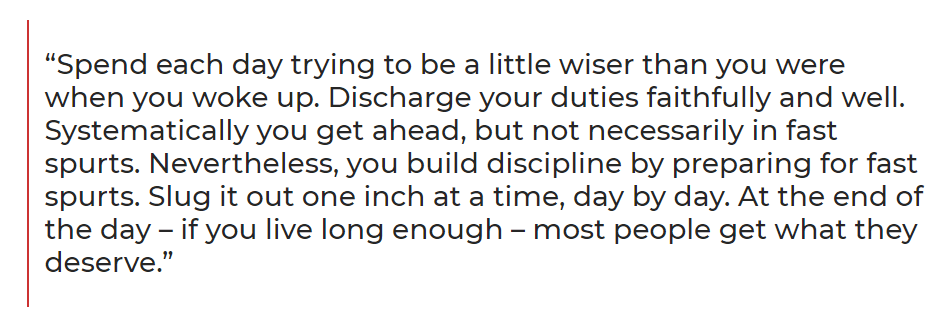Reading Time:15 minutes
It was the year 2012 when an elderly woman walked into the office of a large law firm in a small town in the USA.
The person at the reception was a bit skeptical about whether she has entered the place unintentionally or wanted some respite from cold weather outside.
On inquiry, it was revealed that she wanted to meet someone to take advice on making her will.
When an attorney asked her, what was the amount of her total net worth.
She replied that she didn’t know. She thought maybe about US$40,000 (INR 28 lac).
The real answer? US $6 million (INR 43 crores).
This is a real story from the northern Connecticut town of Simsbury in the USA. The 87 years old woman, named Magowan, was a teacher for 35 years in a local school and taught first grade. She lived a frugal life in a comfortable but not so spectacular house. She saved a lot & invested most of it in stock markets every month, just based on some basic knowledge she inherited from her father.
We can tell ourselves that she was just lucky, we can tell ourselves that she didn’t live her life fully, we can also tell ourselves about the futility of not knowing your net worth throughout your life
We can tell any of this to ourselves, but let’s not miss an important point here – the point is about playing a long game, the point is about the power of compounding -how something starts small and compounds into something big, and the point of understanding the snowball-effect.
The meaning of ‘Snowball-Effect’
Metaphorically a snowball effect is a process that starts from a state of small significance and builds upon itself, becoming larger.
It comes from a very common observation of a snowball rolling down a snow-covered hillside. As it rolls the ball picks up more snow, gaining more mass and surface area, and picking up even more snow and momentum as it rolls along.
The same snowball effect can be used in life in many different ways – it can be applied to your health, it can apply to your learning in a certain domain and it can be equally effective in improving your relationships.
It starts with small changes, small improvements, consistent efforts and improvisations that snowball into a better life.
Hope you’ve heard about Warren Buffet, the world’s richest man. The man is also known as a learning machine and an investment guru. He looks at the investment opportunities across the world and different industries.
We all may wonder about how he knows so much, how he can understand so many different business models as well as different aspects of the economy. And you may be surprised to know that unlike us Warren Buffet does not store information on a computer. It is all in his head.
But how did he reach this stage?
The author of Warren Buffett’s authorized biography The Snowball, Alice Schroeder, tells the story of getting into Buffet’s thinking. In her words:
Starting at a very young age he’s read everything that he could find about business. The subject that interests him, he’s read newspapers, biographies, trade press. He went over to his grandfather who was a grocer and he read the progressive grocer magazine, and he read articles on how to stock a meat department. He’s gone to visit every company that he could find that was even slightly interesting to him, he went down to visit a barrel maker and spent hours talking about how to make barrels. He went to American Express, and he spent hours talking about that business, he went to GEICO and learned about the insurance business. He has stacks of reports on his desk from the companies he owns, pig stalls, jewelry, boat winches, everything you can imagine. He reads hundreds of annual reports every year from companies that he doesn’t own yet because he just wants to understand their businesses, and then when the opportunity arises, then he’s ready and he can make a decision. What he’s really done is he’s created this immense vertical filing cabinet in his brain of layers and layers and layers of files of information that he can drawback on now for more than 70 years’ worth of data.
The knowledge stored in Warren Buffett’s brain over the years has helped make him the most successful investor of our time. But it all started from somewhere small, just like a snowball, from a tiny beginning where even Buffet had no idea where it would take him!
Snowball aka Compounding!
Let’s me introduce you with a principle named 10,000 Hours rule, it has been popularized by several books.
But what does this 10,000-Hour rule mean?
Well, researchers believe that 10,000 hours is the magic number at which a person goes from being average to being a super success. Studies have indicated that ten thousand hours of practice is required to achieve the level of mastery associated with being a world-class expert in anything!
Have a look at the following picture:

What is common among these although they belong to different domains?
One is worshiped as a god of dancing while other is treated like the god of cricket! The 4 guys in black & white created one of the most popular music bands of all the time, the Beatles and then there’s Bill Gates, the one who changed computing by inventing Windows.
You might say that all of them are successful, famous and are extremely wealthy, but think about it!
What are the other common factors among these guys?
Let’s look at how these guys achieved this level of success and fame!
Michael Jackson:
Michael Jackson didn’t explode onto the national scene right away. He was born in 1958, started learning the art at the age of 5 and became a national sensation in the USA in 1979 when his solo album Off The Wall reached number three on US Billboard 200.
How about practicing for many hours a day, starting at the age of 5 years and that too under watchful eyes of your father who is hell-bent to make you learn everything about music and dancing?
Let’s average his daily grind out to 3 hrs a day by 350 (assuming there were breaks in between), that’s 1050 hours per year. By the time you are 15, you have already practiced for 10 years and 10500 hours.
Sachin Tendulkar
He started playing cricket at the age of 10, at 16 he became part of the national team. The reason was his skill which kept on improving as he would practice for 5-6 hours daily, for more than 250 days a year, for 6 years!
Do the maths:
6 hours* 250 days *6 years =9000 hours of hard work.
And it took him another 3 or 4 years before people started calling him a Master Blaster. And later on, he was given a tag of ‘god of cricket’ for showing real consistent performances.
The Beatles
So where do the Beatles come into the story?
This goes back to when The Beatles were nobodies, just like any other struggling high school band playing in old bars of Liverpool.
By chance, they came to know that they could make more money in Hamburg, Germany. It was there that their path to mastery began.
In those days, Hamburg had no rock-and-roll clubs. All it had was strip clubs. There, the Beatles would play at huge, nonstop shows, hour after hour, people lurching in and out.
John Lennon, a member of the band, in an interview talking about his experiences playing the Hamburg strip clubs, said:
“In Liverpool, we’d only ever done one-hour sessions, and we just used to do our best numbers, the same ones, at everyone. In Hamburg, we had to play for eight hours, so we had to find a new way of playing. We had to try even harder, put our heart and soul it in.… We got better and got more confidence.”
The Beatles traveled to Hamburg five times over the space of two years.
On their first trip, they played 106 nights, five or more hours a night, in their 2nd trip, they played 92 times and in the 3rd trip, they were on stage 48 times for a total of 172 hours.
The last two trips involved another 90 hours of performing.
Now total this up, The Beatles performed 270 nights in just in these 5 trips.
At the same time, is also important to note the quality of their practice as well. They were performing to a live audience, getting real feedback and applause.
Just imagine the atmosphere. You are in the midst of a party town, surrounded by a drunk audience! And being in a strip club, you’re not the only entertainment or the prettiest thing to look at. If you aren’t putting your heart and soul into your performance the crowd would not care and you won’t get your next assignment, or the worse crowd would shout you off stage and might throw beer bottles at you.
By the time they finally burst to success in 1964, they had performed live….wait for it… an estimated twelve hundred times!
1200 times! Many a time for 6-7 hours and 10 hours on several other occasions. Add to this their earlier days spent in playing in Liverpool bars, The Beatles clocked up to close 10,000 hours of practice.
Bill Gates
His 10,000 hours began when he was still in school. His parents sent him to Lakeside, a wealthy private school. Lakeside purchased a computer terminal. Remember this was 1968 and most colleges didn’t have computers in those days.

So here was young Bill, an 8th grader, teaching himself how to program.
As time passed, Bill came across another opportunity. Bill got a chance to work with a company named Computer Centre Corporation (CCC). He was required to test out the company’s software programs on the weekends in exchange for free programming time.
Unfortunately, CCC went bankrupt and Bill joined up with another organization called ISI (Information Sciences Inc.). Here they allowed him to have free computer time in exchange for developing software for them to automate its payroll. In 1971, in 7 month period, Gates and his friends worked for 1,575 hours on the computer. This averaged out to be eight hours a day, seven days a week.
When Gates was 16, in his senior year of high school, he worked on an independent study project with a company named TRW, where he would spend his holidays, writing code non-stop.
From 8th grade to the end of high school, Gates was programming practically nonstop, clocking up his 10,000 hours of practice, and when he was still in his teens.
The rest of his story is known to everyone. In 1976, he dropped out of Harvard to start his own company, Microsoft. And in 1995 he became the richest man in the world at the age of thirty-nine.
The Common Thread -Compounding/Snowball Effect.
I hope we all got the missing common thread among all these guys (apart from being famous and being wealthy) – 10000 hours of consistent learning, practice, and efforts.
10,000 Hours rule – Snowball-effect -Power of compounding -all are the same.
Many may say that luck was on their side, Michael had a family obsessed with music, Sachin got a good coach, the bands were rare in those days and Gates could afford to go to an elite school as his parents were rich.
But if we focus on their luck, we are missing the point.
Let’s not forget that they practiced an unbelievable number of hours. They practiced their art intending to improve every day. They used available opportunities without complaining. Most of all, they loved what they did.
(Keep in mind there were others in similar school, many others also happen to have a family having taste in music and there must be many other who had the same coach but all of those others could not encash those ‘golden’ chances , something was amiss in them)
The Power of Compounding!
The most important point here is the power of compounding, the snowball effect.
Small efforts consistently, everyday work on improving your craft, these all add up to huge differences in the long run.
James Clear, the author of one of NewYork Times bestseller books, Atomic Habits puts it very succinctly :
Your outcomes are a lagging measure of your habits.
Your net worth is a lagging measure of your financial habits.
Your weight is a lagging measure of your eating habits.
Your knowledge is a lagging measure of your learning habits.
You get what you repeat.
Mostly we encounter compounding while studying mathematics or in the field of investments but we forget to notice that compounding works in almost all the areas – money, health, relationships as well as mastering any subject.
Why we underestimate the power of this 8th wonder of the world?
Whenever we want to improve ourselves, we often try to make dramatic changes. We want a perfect body within 3 months, we want a perfect career in 3 quarters and we want to be one of the wealthiest people in the world in 3 years.
This approach is often unsustainable.
Peter Drucker, the management guru, said it very rightly:
“People often overestimate what they can accomplish in one year. But they greatly underestimate what they could accomplish in five years.”
Let’s have some visual treat to understand the power of compounding ( we learn better by seeing something)
Here is a chart showing Warren Buffet’s net worth through ages :
His net worth was just $1-million at around 30 years, crossed $1-billion hurdle when was 56 years old and today he is having > 80 billion dollars.
But it didn’t happen overnight, it took years of compounding at a pace of 10-12% per annum.
Let’s move to another domain, a domain of losing weight, to become fit

He is not a celebrity, he is just a common man, like you and me
( that’s why he does not want to share his name) !
No access to special coaches, no surgery or special diets or any magic formula or wonder drug.
Just 5 years of regularly going to the gym, weight-lifting (5 days per week) and some diet control- and see the magic
And there lies the difference!
Most of us somehow believe to make some large, visible changes in life in a short period. Whether it is losing weight, building a business, making money from the stock market, we often try to exert too much pressure on ourselves to show something that everyone will talk about.
Hence, improving by just 1 percent isn’t valued by us or we don’t value it because others don’t notice it.
But ,in real terms and in the long run, it makes all the difference!

As time goes on, these small improvements compound and you suddenly find a very big gap between people who consistently keep putting efforts and those who don’t.
If you get one percent better each day for one year, you’ll end up thirty-seven times better by the time you’re done.
Let’s have another example, it is about savings habits.

Here are three different persons, starting regular savings at different stages of their lives.
Notice the difference in monthly-savings-amount required to reach the same goal of reaching an amount of 2.1 million at the age of retirement?
Tom, who starts early, needs to put less and would earn more from the interest in 30 years as compared to what Harry would put from his pocket.
Compounding and Snowball Effect :
What is in it for you?
Have a long plan but start with small efforts – whether it is savings or learning something or working on your health.
Be consistent, keep improving, keep practicing your craft, take feedback and help from like-minded people and at every year you’ll look back at some part of your old self and wonder how you could’ve been so dumb.
And one day, in less than 20 years, you’ll look back and laugh about yourself. You may wonder how stupid you were!
Being a better self every day? Do we want something else from ourselves?
One’s life is the result of the compounding of one’s every-day actions. Look around! Some rise up above the majority, from focus,vision, discipline & consistency. Others stagnate or keep sinking,in extended well of ignorance,false beliefs, laziness, lack of purpose
Important Tip:
Just play with the compound -interest – calculator once in a month & your view towards spending/saving would change forever.

Once you understand compound interest deeply, you do everything differently
– Eat
– Work/business
– Study
– Exercise
– Relationships
It’s a life-changing concept.
(you can access the compound interest calculator by clicking here)
Is it something new which any of you learned today, I don’t think so!
We have so many sayings in Indian society which give the same message :
बूँद बूँद से सागर भरता है
(Tiny drops make an ocean)
धीरे धीरे रे मना, धीरे सुब कुछ होय
(Every big thing happens slowly, don’t rush)
We all have read these,heard these but most of us don’t apply these.
But let;s try to change :
-Next time you’re drinking that soft drink or eating some junk food, think about the compounding effects.
-Next time you go to the gym, don’t overstretch yourself and stop going from the very next day. Rather go slow.
-Next time you’re spending some money on a gadget that is not a necessity, think of putting that money in savings -think about the compounding effect of either of these.
-And next time when you’re dealing with a customer, colleague or friend, and you’re trying to misguide him for a short term gain, try to think about the compounding effect of the same on your relationship & long-term reputation.
In the end, would like to this write-up with one of my favorite Charlie Munger’s quote :

Good Bye.
If you like this article and if you feel it can be helpful for some of your colleagues, your friends or some relatives, please share with them by pressing the “Tell Others” button on the left-hand side.
39 claps






Excellently explained the importance of compounding in every sphere of life. Very good article for making a change in one’s lifestyle.
Read. Shared. Wonderful article. Thanks a lot for sharing.
It’s a good article. Explained in very simple way with live examples. Definitely patience is the key in compounding.
This is an amazing insight into the well known power of compounding. Brilliantly done.
Compounding well explained..
Inspiring and good to follow.
What an article !!!
Very well illustrated with examples that are very familiar to all readers from different strata.
This is helpful for me to guide my daughter who is in 11th STD now. Yesterday she was complaining about the huge study load/ multiple exam tests from her institute. I was telling her the importance of the regular study to reduce the load. I will like to share this article with her.
Thank you.
Fantastic way to help anybody understand, apply and get the benefits of small, consistent and right set of changes in behaviours, feelings and habits to achieve something; may be unthinkable at beginning!
Thanks for sharing Dear Pran Sahib!
Regards
Manjinder singh
I m following in way of Health & Investment…with your guide lines…
Life changing ideas, well said, these are the Golden Rules of life , really how useful ✌️
You made my day. I am trying do some of things what you shared but the perspective you had given with examples will really help.
Very useful article Sir.
Keep sharing.